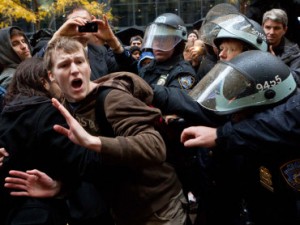Public Policy Polling: Support for #OWS drops

As Occupy Wall Street demonstrations across the nation have started encountering resistance from city authorities, recent data from the Democratic-leaning Public Policy Polling (PPP) firm indicates that voters are less fond of the Occupy movement today compared to last month.
“Last month, when PPP first asked about the movement nationally, voters were split, with 35% supporting the movement’s goals and 36% opposing them. Now, that is 33-45, 11 points worse,” the poll’s findings said.
This latest poll found that opposition has risen across the political spectrum. Among Independents, whose supportive/ non-supportive numbers most notably have gone from 39-34 to 34-42, opposition has increased by approximately 13 percentage points. Republicans’ already low support for the movement has dropped even further, from 13-59 to to 11-71. Currently, 52% of Democrats support the movement’s goals. At the same time, opposition has also risen within this group from 16% to 24%.
Although support for the Tea Party isn’t high among the sample polled, PPP notes that the Tea Party movement is now slightly more popular than the Occupy movement. Currently, 42% support the Tea Party while 45% oppose it. In the previous survey, it was at 39-45.
When specifically asked which movement they have a higher opinion of, voters sided with the Tea Party by 43% to 37%. That’s a reversal of the 40%-37% edge that the Occupy Movement previously held over the Tea Party.
“I don’t think the bad poll numbers for Occupy Wall Street reflect Americans being unconcerned with wealth inequality,” said Public Polling’s Tom Jensen in writing analysis of the poll.
He then went on to posit factors of why this just might be the case. Jensen noted that previous polls conducted by his firm found the following results:
“overwhelming support for raising taxes on people who make over $150,000 a year, 73% of voters supported the ‘Buffet rule,’” and “Senators resistant to raising taxes on those who make more than a million dollars a year could pay at the polls.”
What’s interesting to note, however, is that no polling data was cited in his brief analysis that indicated how Americans felt about the taxpayer-funded TARP program, which was initiated under President George W. Bush and continued under the Obama administration. These are the very bailouts that serve as one of the main rallying points for the Occupy Movement.
Jensen’s analysis of the Occupy Movement did offer what could be interpreted as a key piece of advice for any other future grassroots movements looking to gain traction with the public at large. Specifically, he wrote that:
“what the downturn in Occupy Wall Street’s image suggests is that voters are seeing the movement as more about ‘Occupy’ than ‘Wall Street.’ The controversy over the protests is starting to drown out the actual message.”
With the "Occupy" mantra indeed becoming more prominent in public discourse than "Wall Street," he seems to make a legitimate point. Therefore, I would suggest that, for future grassroots movements to endure, their central message must be fortified enough to:
1). Not be diluted by distractions
2). Not be co-opted
3). Be sufficiently content-rich to resonate and go viral with the disgruntled voting public at large.
PPP surveyed a sample of 800 American voters from November 10th to 13th through automated telephone interviews. The margin of error was +/- 3.5%.





